Cicely Balston | Mastering Engineer, AIR Studios
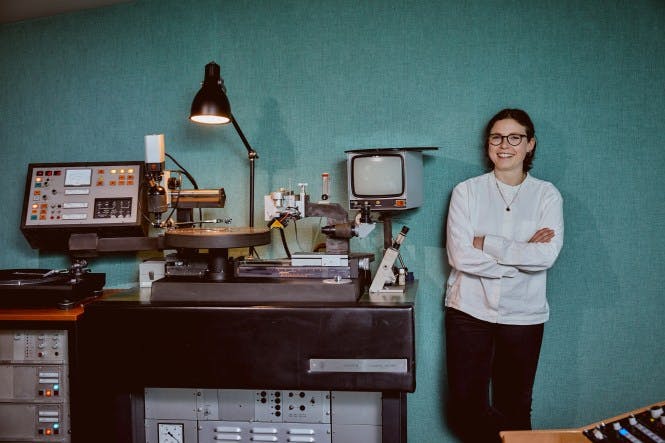
What a pleasure to interview Cicely Balston, mastering engineer at AIR Studios who has been mastering for all formats and genres, both digital and analog since 2013. She cuts lacquers using a Neumann VMS80 lathe, before they are sent off to be electroplated and then to plants for pressing vinyl. Her experience ranges from the opportunity to work with Ray Staff on the David Bowie catalog, to her work on early releases from the saxophonist Nubya Garcia, as well as soundtrack albums for Stephen Warbeck and Harry Escott, and Laurence Love-Greed’s Welsh Bafta-winning score.
In her free time, “I do still play instruments, I think I’m about the same level as I was when I was a teenager … so I play in an orchestra, and a big band when I can“. She also really likes being outside, and getting out into the countryside either on foot or on her bicycle.
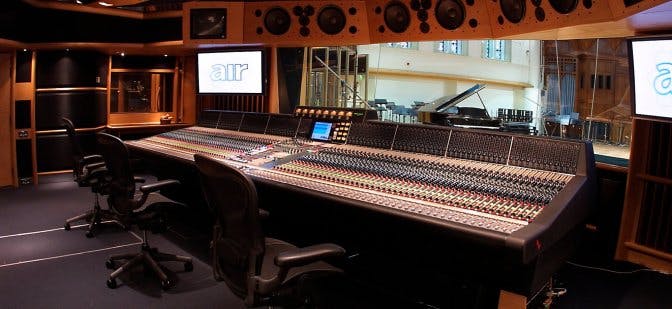
How did you get into your industry / What motivated you to get into it?
Growing up I played a few instruments and was involved in lots of music-making. I wanted to work somewhere in the ‘background’ of the music-making industry, and as well as music I liked science and maths, so I decided to do an audio engineering/sound recording degree. I studied the Tonmeister course at the University of Surrey, and although I’ve done bits of work across the whole industry – recording, mixing, working at a label etc – once I started mastering it’s all I wanted to do. It’s a huge privilege to be able to work on so many different projects and be the final stage before they go out into the world.
What is a day in the life like?
Varied! I spend a fairly even amount of time cutting vinyl masters as I spend doing ‘digital’ mastering (in which the final output is WAV files – I do use analogue processing as part of the mastering process). I usually start the day with mastering, as it’s good to work on fresh ears and make the most of my initial impressions of the project. Cutting vinyl masters is an analogue process, so happens in real time.
Once I’ve done all my tests and checks you end up listening to the whole album from start to finish while you cut (sometimes multiple times if it’s a tricky cut!). I work across all genres of music, so I might be mastering a singer-songwriter EP, then cutting an album of heavy metal, before finishing the day with a couple of 12″ dance cuts – it can be anything! And that’s not to mention checking test pressings, doing revisions to masters, running out final deliveries and discussing future projects.
In your opinion what has been your favorite / the coolest thing you’ve worked on?
I started out assisting an amazing (and legendary, but he’d probably dislike me saying that!) mastering engineer called Ray Staff and we had an ongoing project of remastering David Bowie‘s back catalogue – some of which Ray mastered the first time they were released. Although I’ve worked on plenty of great projects since then in my own right, being part of those sessions, listening to Bowie from the original master tapes and discussing them with people who had been there when they were recorded was an unbelievable experience.
What has been / is the most difficult part of your job?
Within my working day I find ear-fatigue (when you listen too much or too long and lose perspective) something I need to manage carefully.
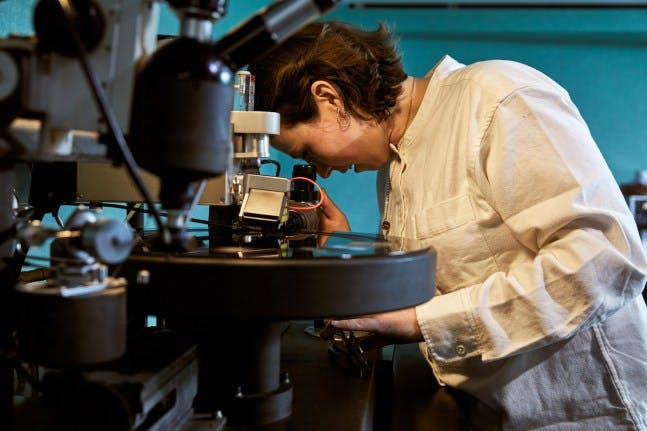
What advice do you have for someone wanting to get into pursuing what you’re doing?
Just do as much listening as you can! Mastering isn’t about having the most expensive compressor or using the most EQs, it’s about really listening to a project and trying to work out what needs to happen (if anything) to make the listening experience as good as possible for that track/piece/project.
You need to know your system, and the tools you do have as well as you possibly can, and the best way to do that is to listen.
And then having some technical understanding of audio and acoustics/electro-acoustics helps too, for that books like Bob Katz’s ‘Mastering Audio’ or Francis Rumsey’s ‘Sound and Recording‘ are both ones I have and would recommend.
Are you a vinyl collector yourself? What drew you to it?
I can’t say I’m a huge collector, I’ve had to move house too many times to be able to maintain much of a collection; but I do have some records and a record player and if I’m not too exhausted from listening all day at work, I do like to listen to them! Particularly special to me are the records I’ve got from my Grandad’s collection, he lived in various places across South America for awhile and had lots of records that he picked up during his travels.
What I love about cutting vinyl is how mechanical and technical it is, to create something so artistic and beautiful – from the artwork, to the sleeve notes to the actual music on the disc – it’s quite a feat of technical expertise (if I do say so myself) and manufacturing, and such a lovely product at the end!
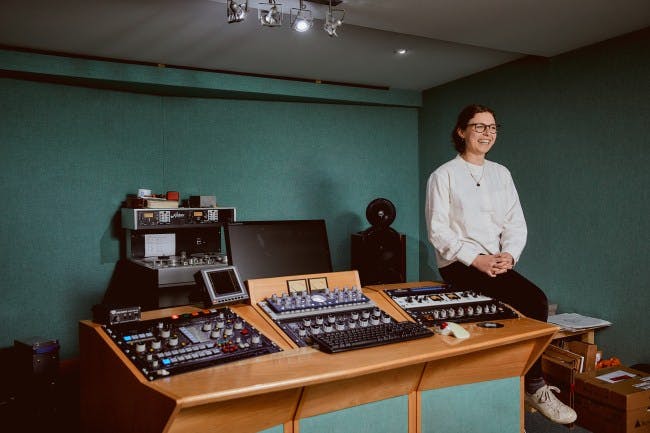
What types of things are happening in your industry / with vinyl that you’re excited or worried about?
We (like everyone) are having courier issues due to Brexit, which so far has not caused too many problems for us, but it’s best for lacquers to be processed as soon as possible after being cut. We send lacquers all over the world (though predominantly to the European mainland) and it’s not ideal if they get stuck in customs. The lead times on getting pressings are getting pretty long as well, which I think is a bit of a logistical worry for lots of our clients.
During this time we’re currently in, what message do you have for music and vinyl fans? How can we support you, the industry?
Be patient and maintain your enthusiasm! If the lead times on a pressing is months and months, it might be that artists need to release digitally first and vinyl after that – do still buy the record when it comes. And I think in the wake of all the lockdowns especially, I’ve been trying to get out to gigs where possible – or if not possible, buy the merchandise, pre-order the records, save tracks to Spotify etc. we should all try to be proactive in our support, I guess.
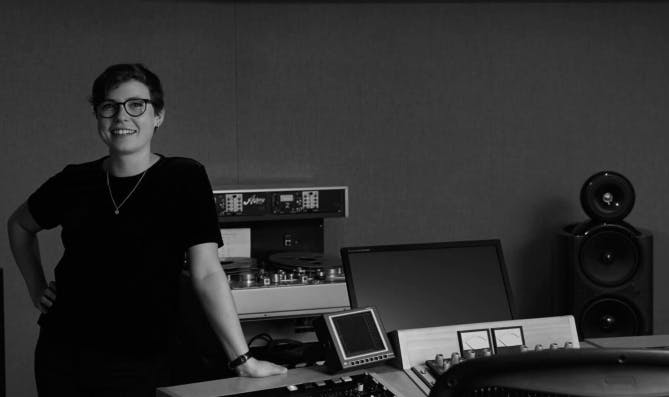
What are you listening to?
I’ve recently found all my CDs from when I was a teenager and set a CD player up in my kitchen and am re-visiting all the jazz I used to listen to when I was younger (and a keen saxophone student), Dexter Gordon, Lee Morgan, Ella Fitzgerald and lots of others.
Find Cicely:
Instagram:
Cicely: @cicelybalston
AIR Studios: @airstudioslyndhurst
Facebook: @AIR-Studios
Twitter:
Cicely: @CicelyBalston
AIR Studios: @airstudios
Discogs: www.discogs.com/artist/3815243-Cicely-Balston
Website: www.airstudios.com/cicely-balston/
We hope you enjoyed this content! If so inclined please donate so we can continue bringing you more like this. There is no amount too small.

